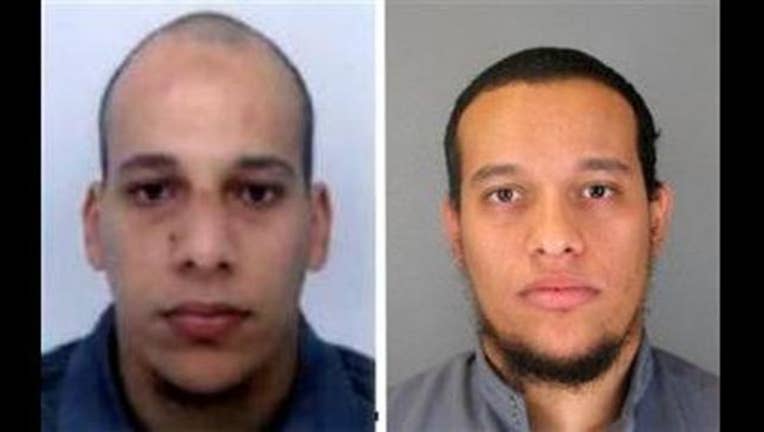Suspects in Charlie Hebdo massacre killed, hostages freed

The lightning-quick strikes ended two tense, hours-long standoffs, one at a printing plant north of the city and the other at a kosher supermarket on Paris' east side, where Reuters reported four hostages were killed. A hostage held north of the city by the brothers, who killed 12 in a commando-style attack at the offices of Charlie Hebdo, was reportedly freed. The fast-moving developments, signaled by explosions and gunfire at a printing plant in Dammartin-en-Goele, followed by similar sounds at Hypercacher (Hyper Kosher), a Jewish supermarket in eastern Paris, brought to a climax a three-day terror ordeal and manhunt involving nearly 90,000 police and military personnel.
Cherif and Said Kouachi, the radicalized French-born slackers whose attack on Charlie Hebdo left two police officers among the dozen dead, were both killed in the first raid. The brothers, 32 and 34, respectively, are believed to have ties to Al Qaeda in Yemen, and military experts who viewed footage of their bloody, late-morning raid on Wednesday said they appeared to be well-trained terrorists. Charlie Hebdo had long angered Muslim radicals with its penchant for publishing cartoon images of Prophet Muhammed.
In Paris, police said Amedy Coulibaly, who is believed to have know the brothers and was suspected of killing Paris Police Officer Clarissa Jean-Philippe Thursday, as she attended to a routine traffic accident in the city, was killed in a raid moments later, ending his supermarket siege. Police had identified him and his longtime girlfriend, Hayat Boumeddiene, as suspects, but her whereabouts were not immediately known.
Coulibaly, 33, and Cherif Kouachi were committed followers of convicted terror kingpin Djamel Beghal, according to Le Monde.
Earlier Friday, a French security official told the AP that shots were fired as the brothers stole a car in the town of Montagny Sainte Felicite in the early morning hours. French officials told Fox News that the suspects threw the car's driver out at the side of the road. The driver, who recognized the suspects, then called police and alerted them to the suspects' whereabouts.
On Thursday, U.S. government sources confirmed that Said Kouachi had traveled to Yemen in 2011 and had direct contact with an Al Qaeda training camp. The other brother, Cherif, had been convicted in France of terrorism charges in 2008 for trying to join up with fighters battling in Iraq. The sources also confirmed that both brothers, who had been orphaned as youngsters and spent years committing petty crimes and doing menial jobs, were on a U.S. no-fly list.
Fox News was told the investigators have made it a priority to determine whether he had contact with Al Qaeda in Yemen's leadership, including a bomb maker and a former Guantanamo Bay detainee.
French President Francois Hollande called for tolerance after the country's worst terrorist attack since 1961, in the middle of the conflict over Algerian independence from France.
"France has been struck directly in the heart of its capital, in a place where the spirit of liberty -- and thus of resistance -- breathed freely," Hollande said.
Charlie Hebdo had long drawn threats for its depictions of Islam, although it also satirized other religions and political figures. The weekly paper had caricatured the Prophet Muhammad, and a sketch of Islamic State's leader was the last tweet sent out by the irreverent newspaper, minutes before the attack. Nothing has been tweeted since.
Eight journalists, two police officers, a maintenance worker and a visitor were killed in the attack.
Charlie Hebdo planned a special edition next week, produced in the offices of another paper. Editor Stephane Charbonnier, known as Charb, who was among those slain, "symbolized secularism ... the combat against fundamentalism," his companion, Jeannette Bougrab, said on BFM-TV.
"He was ready to die for his ideas," she said.
Authorities around Europe have warned of the threat posed by the return of Western jihadis trained in warfare. France counts at least 1,200 citizens in the war zone in Syria -- headed there, returned or dead. Both the Islamic State group and Al Qaeda have threatened France -- home to Western Europe's largest Muslim population.
The French suspect in a deadly 2014 attack on a Jewish museum in Belgium had returned from fighting with extremists in Syria; and the man who rampaged in southern France in 2012, killing three soldiers and four people at a Jewish school, received paramilitary training in Pakistan.

